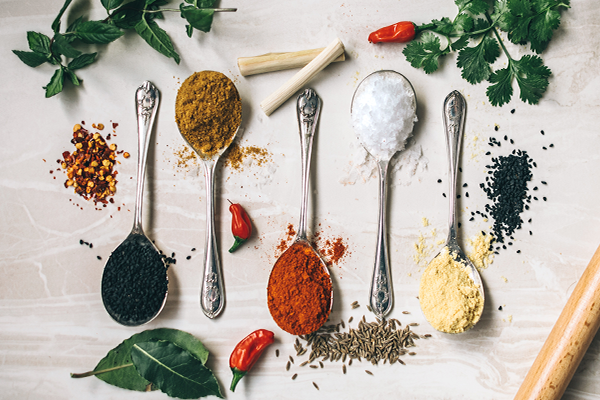When we think about food, most of us think about how it tastes when we are eating it. And that’s because how something tastes when we put it into our mouth can often determine whether we choose to eat it again. So, for example, some of us love salty-flavoured foods, while others prefer something spicy. But, of course, the value of what we choose to eat is so much more than how it tastes.
Chinese medicine has five different food flavours, each with its own characteristics and functions for health. That means that not only do each of the food flavours taste really different, but they can also act on specific organ imbalances within the body.
The theory behind Chinese medicine uses different food flavours and herbs to balance the body better. This idea means that certain flavours act on one organ more than others. The organs in our body try to balance themselves through our diet. When an organ is sick, the body can tell you what organ may need support from the foods you crave. It’s a fascinating topic to explore. So, let’s dive into the five flavours and see what we can learn together.
BITTER
Some examples of bitter foods we will all recognise are asparagus, celery, chamomile, citrus peel and Romaine lettuce. Bitter flavours can clear heat from the body. In Chinese medicine, bitter flavours go to the heart first and can help the heart function when it’s in disorder.
The Bonus of Bitter Foods:
- Helps reduce fever when there’s inflammation and infection.
- Helps clear heat conditions in our lungs like yellow phlegm and dries up mucous.
- Helps clean arteries of damp deposits like cholesterol and fats.
- Helps drain damp conditions like Candia, edema, swelling, skin breakouts and cysts.
- Helps induce bowel motions and alleviate constipation.
SOUR
Some examples of sour food we all recognise are lemon and lime, pickles, sauerkraut, apple, sour plum and black and green teas. Sour flavours can calm the body. In Chinese medicine, the sour flavour goes to the liver first and can help the liver function in disorder.
The bonus of Sour foods:
- Helps digestion and improves how the body absorbs nutrients.
- Helps reduce abnormal leakage of body fluids and energy and firms up loose and saggy tissues.
- Helps strengthen weak lungs.
- Helps organise a scattered mind.
SWEET
Some examples of sweet food we all recognise are grains and legumes like wheat, rice and oats, as well as cabbage, carrot, cherry, fig, molasses, peas, shiitake, sweet potato, rice syrup, walnut and yam. Sweet flavours can increase the available energy of a bodily part or system. The sweet flavour harmonises and relaxes and encourages energy to expand upwards and outwards in the body. For example, in Chinese medicine, the sweet flavour goes to the spleen first and can help the spleen function when in disorder.
The Sweet Things About Sweet Foods:
- Helps to build tissue and fluids and strengthens weakness.
- Helps to moisten dry lungs.
- Helps to relax the body and soothes an aggressive liver which can manifest as anger and impatience.
- Helps to slow the overactive heart and mind.
PUNGENT
Some examples of warming, pungent food we recognise are anise, basil, black pepper, cayenne, cloves, dill, fennel, garlic, ginger, horseradish, onion, nutmeg, rosemary and scallion. Examples of cooling pungent food we all recognise are elderflower, marjoram, peppermint, radish, and white pepper. Pungent and spicy flavours can expel wind and cold from the body. The pungent flavour moves energy upwards and outwards and has dispersing effects. In Chinese medicine, pungent flavour goes to the lung first and can help the lung function when in disorder.
The Power of Pungent:
- Helps to stimulate digestion.
- Helps to disperse mucus caused by mucus-forming foods like dairy and clears the lungs of mucus conditions from the common cold.
- Helps to induce sweating from the common cold.
- Helps to stimulate blood circulation, clears obstructions and disperses stagnant blood.
SALTY
Some examples of salty flavour foods include barley, salt, seaweed, soy sauce, millet, miso, and pickles. Salty flavours can help the body dissolve stagnation. For example, in Chinese medicine, salty flavours go to the kidney first and can help the kidney function when in disorder.
The Benefits of Salty:
- Helps to soften hardness and stiffness, for example, hardened lymph nodes, cataracts and knots in muscles.
- Helps improve digestion and relieves constipation by purging the bowels.
- Helps to reduce heat signs and remove toxins when applied externally.
Author:
Dr Rachel Woo (TCM)
Morningside Acupuncture & Natural Therapies Healing Sanctuary
14/02/23
Disclaimer: Advice on this site is not a substitute for advice from a medical practitioner. If you have concerns, consult your medical practitioner first.

